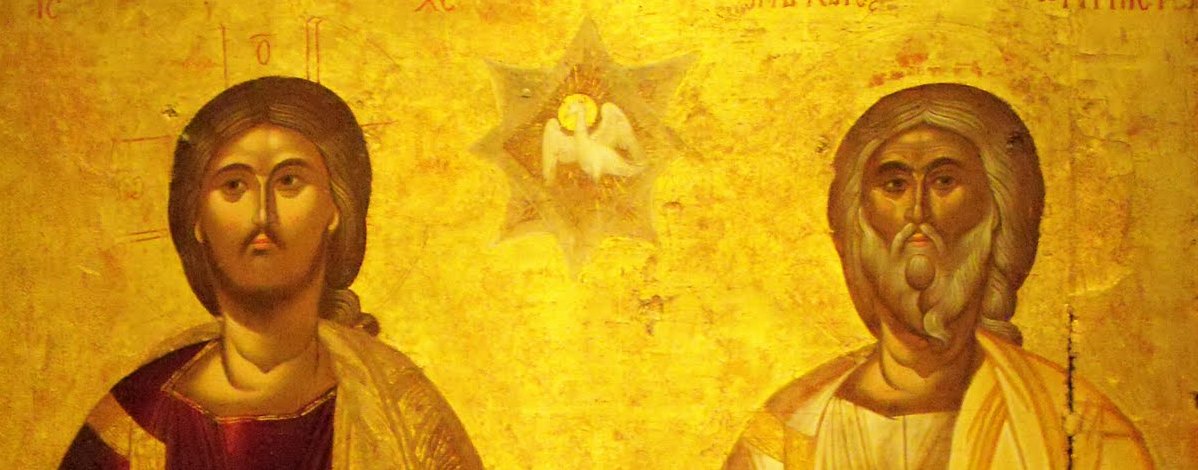Trinity Sunday
Sunday, May 30, 2021
Today, on the Solemnity of the Most Holy Trinity, we’re going to take a little journey into the greatest mystery humankind has ever encountered: the mystery of the Godhead itself. Are you excited?
We are monotheists not polytheists. Our faith springs from the profession found in the Jewish Shema: “Hear O Israel, Yahweh is God; Yahweh alone.” Our God, Yahweh, like a blinding light or a deafening noise, overwhelms our senses and so cannot be perceived; God boggles the mind and so cannot be conceived of. What we know of Yahweh, we have pieced together out of our knowledge and understanding of the universe and the shared experience of the godly men and women who came before us. For us, Yahweh is the God of creation and the God of our ancestors. So, what have we learned of God through these sources? We know, first of all, that Yahweh – the Lord – is the source of all that is not God. Yahweh created individuality. God made it possible for you and me to exist.
That was not enough. God immersed himself in creation – God within the “not-God” – so that all creation could encounter the Creator mere by looking within. And when we looked within, we found an image of our perfect selves looking back at us. We found a person, not an impersonal force. We found a living, conscious being hiding in plain sight at the core of our universe: a person who speaks to us of existence, of life, of consciousness, and of love. Only a conscious being can love. And it’s a miracle that, when we love the universe, it loves us back in return. It speaks to us in words that we can see and hear, that we can taste, touch, and smell. The universe reaches out to us and joins us in our pilgrimage through time. “And the Word was made flesh and dwelt among us” – a personal Word, for there’s no such thing as an “impersonal” word. Communication only happens between persons. “And the Word was God.” This Word cannot have two meanings. There is only one Yahweh: one source and meaning to reality. When we encounter this Word, this Christ, this Messiah, we encounter Yahweh.
“Show us the Father,” Philip asked Jesus.
“Have I been with you so long and still you do not know me? He who sees me, sees the Father.”
Last week, when we celebrated the feast of Pentecost, we encountered Jesus, risen from the dead, and breathing the Spirit of Creation – the Holy Spirit – saying, “Receive the Holy Spirit; whose sins you shall forgive, they are forgiven them.” Like the Pharisees of Jesus’s time, we ask, “But who can forgive sins but God alone?” It is the Spirit of reconciliation, the Spirit of healing and restoration that was given to us. It’s even more than that, as Saint Paul tells us in today’s second reading. “…you received a Spirit of adoption, through whom we cry, ‘Abba, Father!’” When God adopts, it’s not like human adoption. It’s more than just a name change. It’s a life change. We are grafted onto the vine which is Christ, and we live by the life force – the vital sap – which enlivens the vine. The Spirit grafts us onto the Father and, by so doing, grafts us on to one another. We are now one body, one Spirit in Christ.
In today’s gospel, we hear Christ’s apostolic commission: the responsibility that was entrusted to the apostles and, through them, to us. It is this: to make disciples of everyone – for we are all now God’s chosen people – and to baptize them in the name of the Father, and of the Son, and of the Holy Spirit. What is this baptism, anyway?
Think of it as an adoption ritual. An adoption ceremony, for us, means one goes into it as a child of one family, and comes out of it a child of another. In Christin baptism, we go into it a child of humanity, subject to the futility and eventual death that is the heritage of our human nature. We die with Christ in the water, and we rise with Christ as we emerge. A fundamental life change happens. Through the life force of the Spirit of God, we become grafted onto the Father – Yahweh God – through the Son by which we know him, by means of God’s own life force which we have received in the Spirit. The person of the living Spirit transforms our personality and gives us new purpose, new direction, and, most importantly, new life power that goes beyond our human defects and weaknesses and overcomes even death itself. It is our Abba, our Father-God who shares with us this Spirit of life through his eternal Word.
I hope all of this is perfectly clear to you. It’s not? Well, then, all you really need to take away with you from today’s liturgy is this: we have been baptized into the Father, through the Son, by the Holy Spirit. It is no longer we who live, but Christ who lives in us.
